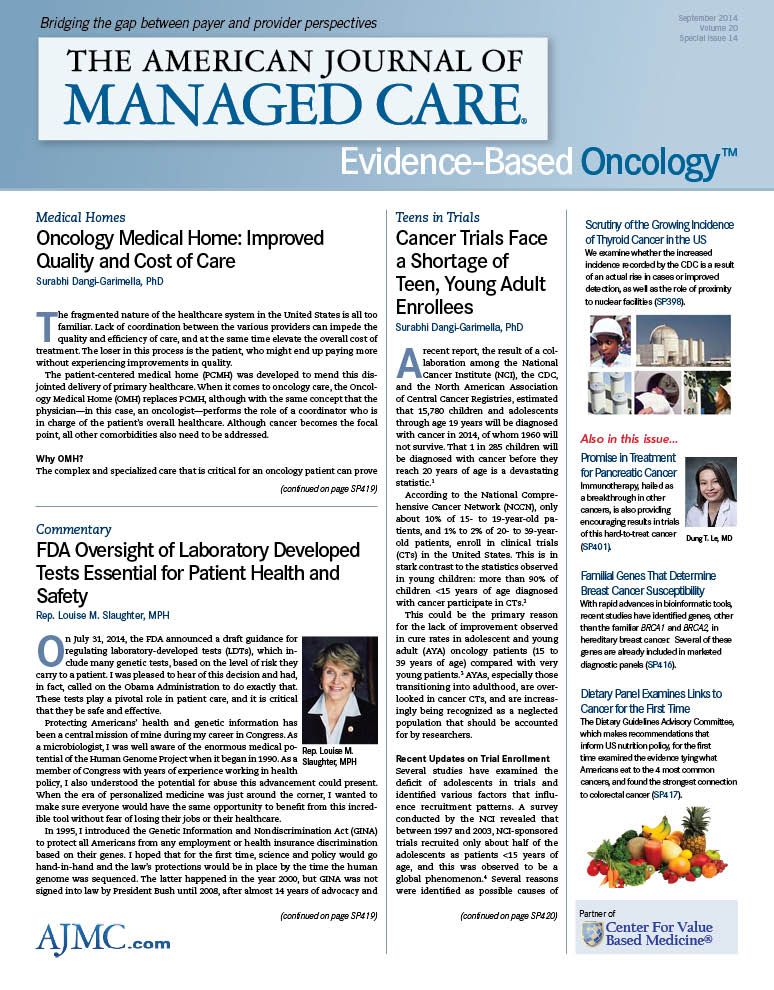- Center on Health Equity & Access
- Clinical
- Health Care Cost
- Health Care Delivery
- Insurance
- Policy
- Technology
- Value-Based Care
Breast Cancer Survivorship Programs: More Than a Treatment
Patients who have survived the challenges of breast cancer (and its treatment) may find themselves in remission or cancer-free but still experiencing long-term complications, such as lymphedema, fatigue, weakness, osteoporosis, cardiovascular disorders, and cognitive difficulties. The traditional care model for breast cancer survivors focuses on ongoing surveillance to detect recurrence, but does not specifically address their psychological and supportive care needs.1 Cancer survivorship programs seek to improve coordination of care after the initial treatment of cancer ends.2 With the number of cancer survivors on the rise, these programs may have particular value for the growing population of those surviving a bout of breast cancer. These programs emphasize providing surveillance for long-term treatment complications, adhering to clinical guidelines, meeting patients’ psychological needs, and providing supportive care services.1,3,4 Most major cancer centers in the United States offer these programs. Although the evidence that breast cancer survivorship care programs improve outcomes is limited thus far, patients and providers believe they are of value.3,5 Ganz’s group in UCLA2 published evidence that breast cancer survivors were undergoing unnecessary testing and not getting mammograms when they should, with high variability among individual physicians’ patterns of care.
Access to breast cancer survivor care programs is limited. One study found that only 35% of eligible women older than 65 years received a breast cancer survivorship care plan.3 These investigators found that age discrimination may play a role in who receives a survivorship care plan: for each 1-year increase in age, researchers found a 5% decreased probability that the patient would receive a survivorship care plan.3
According to some researchers, employing the Patient-Centered Medical Home or shared-care model, using a multidisciplinary approach, can build improved survivorship programs.6 The prospective surveillance program1 forms the basis for addressing breast cancer survivorship—a sort of rehabilitation of the person from the physical, clinical, and psychological perspective.
The following are but a few examples of breast cancer survivorship programs that embrace the multidisciplinary approach:
• Lynn Sage Breast Cancer Survivorship Program at the Robert Lurie Comprehensive Cancer Center of Northwestern University (http://cancer.northwestern.edu/public/why_northwestern/specialty_programs/programs/womens.cfm)
• UCLA-LIVESTRONG™ Survivorship Center of Excellence at the UCLA Jonsson Comprehensive Cancer Center (http://www.cancer.ucla.edu/Index.aspx?page=221)
• Breast Cancer Survivorship Clinic at MD Anderson Cancer Center (http://www.mdanderson.org/patient-and-cancer-information/cancerinformation/cancer-topics/survivorship/follow-up-care/breast.html)
• The Breast Cancer Survivorship Initiative at the University of Michigan Comprehensive Cancer Center (http://www.mcancer.org/breastcancer/survivorship)
An important requirement of survivorship programs (or good follow-up care in general) is coordination of healthcare personnel. Studies have found gaps in sharing treatment summaries and overall survivorship care plans between medical oncologists and primary care physicians.2 Only 20% of the oncologists said they share the full survivorship plan with the primary care physician (PCP), and 50% claim to share a treatment summary only. The percentages of PCPs claiming to receive this information from oncologists are far lower.2
There is activity afoot at the National Committee for Quality Assurance (NCQA) to address the sharing of cancer survivorship program information between PCPs and oncologists. Patricia Barrett, MHSA, NCQA’s vice president of product development and policy, told Evidence-Based Oncology about a pilot project that is under way to implement and test patient-centered oncology care. Under a contract with the Patient Centered Outcomes Research Institute (PCORI), NCQA is extending the patient-centered medical home model to oncologists.NCQA’s accreditation program applies to other specialty specialist groups, called patient-centered specialty practices (PCSPs), which build off the same requirements. How did cancer survivorship programs arise as a measure for oncology specialty practices? Barrett explained, “It came
EBO
from conversations with cancer survivors and oncologists on our advisory group. It grew out of things that already were in place with regard to transitions from specialty back to primary care. And it clearly is something that is patient centered.” In terms of the requirements of cancer survivorship programs for accreditation purposes, “NCQA is not highly specific about the communication includes,” said Barrett. “It must consist of a summary of care and an ongoing plan of care from the oncologist to the primary care physician.” The PCP will then coordinate the patient’s care with other specialists as needed, per the care plan. “Primary care is expected to have that central coordinating role,” she stated. References
1. Stout NL, Binkley JM, Schmitz KH, et al. A prospective surveillance model for rehabilitation for women with breast cancer. Cancer. 2012;118(8 suppl):2191-2200.
2. Forsythe LP, Parry C, Alfano CM, et al. Use of survivorship care plans in the United States: associations with survivorship care. J Natl Cancer Inst. 2013;105(20):1579-1587.
3. Faul LA, Luta G, Sheppard V, et al. Associations among survivorship care plans, experiences of survivorship care, and functioning in older breast cancer survivors: CALGB/Alliance 369901 [published online June 11, 2014]. J Cancer Surviv.
4. Stan D, Loprinzi CL, Ruddy KJ. Breast cancer survivorship issues. Hematol Oncol Clin North Am. 2013;27(4):805-827.
5. Hill-Kayser CE, Vachani C, Hampshire MK, Metz JM. High level use and satisfaction with internet-based breast cancer survivorship care plans. Breast J. 2012;18(1):97-99.
6. Gerber LH, Stout NL, Schmitz KH, Stricker CT. Integrating a prospective surveillance model for rehabilitation into breast cancer survivorship care. Cancer. 2012;118(8 suppl):2201-2206.

Specialty and Operator Status Influence Electronic Health Record Use Variation
January 22nd 2026Operators demonstrated specialty-specific differences in electronic health record efficiency, timeliness, and after-hours use, highlighting how workflow and training shape documentation behaviors across medical disciplines.
Read More
Exploring Racial, Ethnic Disparities in Cancer Care Prior Authorization Decisions
October 24th 2024On this episode of Managed Care Cast, we're talking with the author of a study published in the October 2024 issue of The American Journal of Managed Care® that explored prior authorization decisions in cancer care by race and ethnicity for commercially insured patients.
Listen

